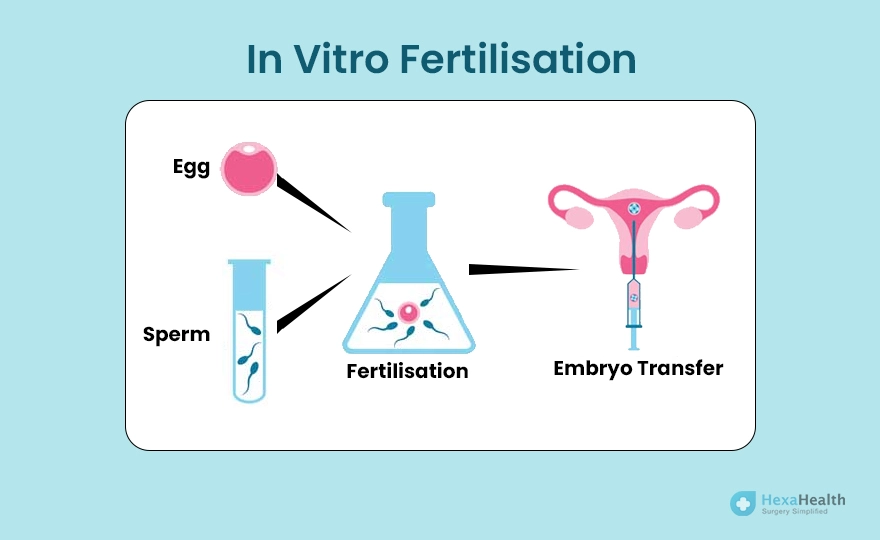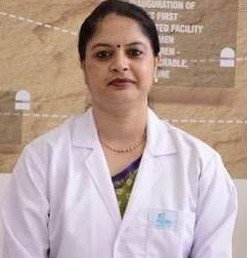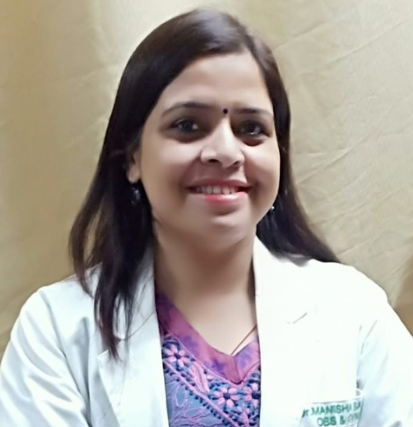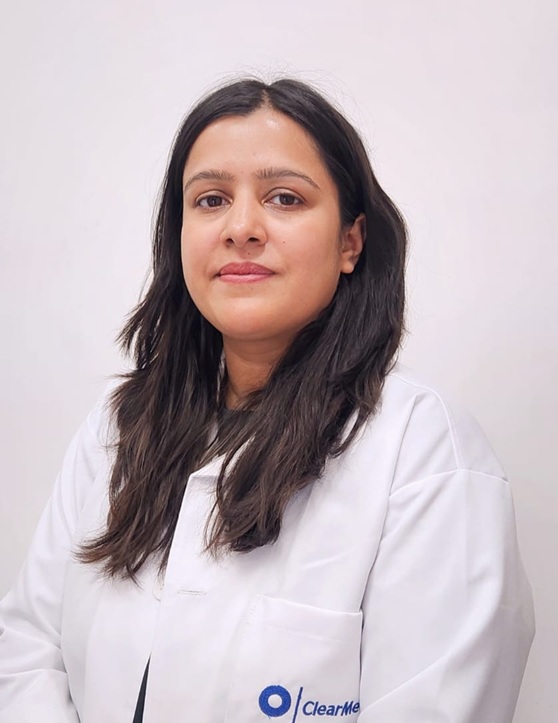In Vitro Fertilization (IVF) - Process, Images, Risks and Results
Dr. Monika Dubey

Treatment Duration
45 Minutes
------ To ------60 Minutes
Treatment Cost
₹ 75,000
------ To ------₹ 1,50,000

Table of Contents
- What is IVF?
- Who needs IVF?
- How is In Vitro Fertilization performed?
- What to expect before and on the day of In Vitro Fertilization?
- What to expect after In Vitro Fertilization?
- Benefits of IVF Treatment
- Risks and Complications of In Vitro Fertilization
- What will happen if IVF procedure is delayed?
- Cost of the Surgery
- Summary
Have you heard about IVF and are curious about the IVF full form and What IVF actually is? Don’t worry! You are at the right place.
In Vitro Fertilisation (IVF) or Test-Tube Baby is a popular fertility treatment in India, which provides hope and options for couples who are struggling to conceive naturally. Unlike the natural birth process, IVF takes place under lab conditions, and the babies produced by this procedure are known as Test tube babies.
It provides encouragement to individuals who may face various fertility challenges, such as blocked fallopian tubes, male infertility, advanced maternal age, or unexplained infertility.
Keep reading to know more about IVF and how it can help in changing your life.
|
Surgery Name |
In - Vitro Fertilization |
|
Alternative Name |
Test Tube Baby |
|
Conditions Treated |
Infertility or Genetic problems faced by couples. |
| Benefits of the Surgery | Timings of your choice, Increased chances of having a healthy baby, Decreased chances of Miscarriage |
|
Treated By |
Obstetrician and Gynaecologist, IVF specialist (Reproductive endocrinologist) |
You can check In-Vitro Fertilization (IVF) Cost here.
What is IVF?
Fertilization is a remarkable and intricate process that marks the beginning of a new life. It brings together the genetic material from both parents, determining the unique traits and characteristics of the offspring.
In vitro fertilization (IVF) is a type of Assistive Reproductive Technology (ART). It is a complex process that involves retrieving eggs from ovaries and manually combining them with sperm in a lab for fertilization.
Several days after fertilization, the fertilized egg (now called an embryo) is placed inside a uterus. Pregnancy occurs when this embryo implants itself into the uterine wall inside the female body.
Anatomy and Physiology
Human fertilisation is the union of a human egg and sperm, which occurs in the ampulla of the fallopian tube.
Sperms are attracted to a naturally occurring hormone in a woman’s body, named progesterone.
The fertilisation of the male sperm and female egg results in the formation of the zygote, which then results in the formation of a human child.
In-Vitro Fertilization (IVF) Videos by HexaHealth
Expert Doctors (10)
NABH Accredited Hospitals (10)


Who needs IVF?
IVF is chosen by people for a variety of reasons, such as infertility problems or when one couple has a pre-existing medical condition. Some people try IVF if previous reproductive treatments haven't worked or if they're at an advanced maternal age.
Mainly, IVF is used for couples facing infertility-related problems like:
- Blockage of fallopian tubes due to the removal of an ectopic pregnancy or because of infection.
- IVF is done if a woman couldn’t conceive, even after there is a good development and timely rupture of follicles, even after 6-8 cycles of intrauterine insemination or other similar treatments.
- If you have grade 3 or 4 endometriosis during the first laparoscopy.
- Women with decreased ovarian reserve require test-tube baby procedures.
- Polycystic ovary syndrome (PCOS) or other ovarian conditions.
- If you are above 38 years of age and want to conceive, then this procedure is beneficial.
- If your partner’s sperm function degenerates or if there is abnormal semen.

How is In Vitro Fertilization performed?
The procedure is divided into five stages, which involve:
Stimulation
- In females, one egg is produced during each menstrual cycle. But this procedure requires multiple eggs to increase the chances of developing a viable embryo.
- The female will be given fertility drugs to help the body increase the count of eggs.
- The doctor will perform regular tests and ultrasounds to check egg production and know when to retrieve them.
Egg Retrieval
- This is also known as follicular aspiration.
- It’s a surgical procedure performed under anaesthesia.
- An ultrasound wand will be used during the egg retrieval, which will help the doctor lead the needle through your vagina, into your ovary, and then into the egg-containing follicle.
- Suctioning of the eggs will be done by using a needle.

Sperm Retrieval
- In this step, your male partner will be asked to give a semen sample.
- Semen will be prepared for further process.

Embryo Culture
- The technician will mix the sperm and eggs in a petri-dish to form an embryo, and if the embryo is not formed, your doctor will decide to use an Intracytoplasmic sperm injection.
- The doctor will monitor the fertilised eggs to make sure that it is dividing and developing.
- The embryos may undergo testing for genetic conditions at the same time.

Transfer
- In this step, the doctor implants the embryos into the uterus through the vagina and cervix with the help of a catheter.
- This occurs three to five days after fertilisation.
- When the embryo implants itself into the uterine wall, the pregnancy may take 6-10 days. The blood test will determine if you are pregnant or not.

What to expect before and on the day of In Vitro Fertilization?
Before the IVF Surgery
Before the surgery, your doctor will go through the following preparations.
- To check your egg's quality and quantity, your doctor will test the concentration of the follicle-stimulating hormone, oestrogen, and anti-mullerian hormone in your blood during your menstrual cycle.
- You will be advised to take a few blood tests and have a vaginal ultrasound.
- Your doctor will conduct a semen analysis of your male partner before the start of the treatment.
- The doctor will ask both you and your partner to undergo screening for infectious diseases, including HIV.
- Your doctor will practice a mock embryo transfer to determine the depth of your uterine cavity.
- Before the start of the treatment, your doctor will examine the inner lining of your uterus.
- You will receive injectable medication containing follicle-stimulating hormone, luteinizing hormone, or both.

On the day of the IVF Procedure
- Your doctor will ask you to sign the consent form in the presence of your partner.
- You will be told to drink 20-30 oz of fluid 1 hour before the transfer.
- You will be advised against wearing any fancy loungewear because embryos are sensitive to odours.
- Before embryo transfer, you will have to go through a series of verifications.
What to expect after In Vitro Fertilization?
After IVF Procedure
- Once the procedure is done, your doctor will advise you to continue your daily activities but avoid any vigorous activity.
- Your ovaries will stay enlarged after the procedure.
- Due to the swabbing of the cervix before embryo transfer, there may be a small amount of clear or bloody fluid after the procedure.
- You will have breast tenderness because of your high oestrogen level and might have mild constipation, cramping, and constipation.
First follow-up Appointment
- The first follow-up will be 2-5 weeks after the embryo transfer and pregnancy confirmation. It is usually scheduled when you are 5-6 weeks pregnant.
- Your doctor will perform the first ultrasound to detect the foetal heartbeat.
- This is the time when the doctor confirms whether the pregnancy is single or multiple and if the development is normal.
- The doctor will advise you to eat healthily and do regular pregnancy exercises.
- The doctor will schedule your further timely follow-ups.
Benefits of IVF Treatment
Comparing the risks to the benefits of IVF helps in making the decision much easier. With IVF, you don't have to choose between job and family planning at the age of creating a career or making money. In vitro fertilization can help with
- In-Time Family Planning: You don’t have to worry about getting pregnant in your 20s with IVF. Even if you are suffering from any infertility problem you can always opt for IVF. You can plan your pregnancy whenever you want with the help of your healthcare provider.
- High Chance of Conception: With IVF there are high chances of conceiving as the fertilization is done outside the body then the embryo is transferred inside the mother’s womb which enhances the chances of conception.
- Ability to Select Healthier Embryos: Preimplantation genetic screening is done at the time of IVF which helps to check that the foetuses utilized in IVF are devoid of genetic markers that can cause any abnormality. With IVF, you have the capability to select healthier embryos.

Risks and Complications of In Vitro Fertilization
Like any other procedure, there are also potential risks and complications. The most common complications associated with IVF treatment are the failure of treatment. Other risks and complications of IVF are
- Multiple Pregnancies: With IVF, the risk of multiple pregnancies increases because more than one embryo is transferred to the mother’s womb (uterus).
- Ovarian Hyperstimulation Syndrome (OHS): It is an exaggerated response to hormones. Before and during the IVF procedure, injectable hormones are given to females to stimulate the development of eggs in the ovaries. But too many hormone injections can lead to ovarian hyperstimulation syndrome.
- Ectopic Pregnancy also known as Extra-uterine pregnancy is a condition where the embryo is attached anywhere outside the uterus. During the IVF procedure, It can be hard to diagnose at the early stages of pregnancy and can lead to life-threatening complications if not treated as soon as possible.
When to consult a doctor?
Seek medical care immediately if you have:
- Heavy vaginal bleeding
- Severe pain during bowel movements
- Severe pelvic pain
- Moderate to severe cramping or bloating
- An infection, vaginal soreness, or severe pain in the ovaries
- Severe tenderness in your breast
- Feeling tiredness or fatigue
- High fever

What will happen if IVF procedure is delayed?
Delayed or late-age IVF, typically beyond the age of 35, comes with several risks. Here are some of the potential risks associated with delayed age IVF:
- As women age, their fertility declines due to a decrease in the quantity and quality of their eggs.
- With advancing age, the quantity of eggs decreases. The egg quantity may limit the number of viable embryos available for implantation during IVF, thereby reducing the chances of a successful pregnancy.
- Ovarian hyperstimulation syndrome, which causes swelling and pain in the ovaries.
- Miscarriage for a woman.
- Damage to the bowel, bladder, or blood vessels.
- Increased chances of ectopic pregnancy and birth defects in babies.

Cost of the Surgery
Infertility can be tough for people who want to get pregnant naturally. IVF is a well-known treatment for couples who are unable to conceive naturally. The cost varies based on the following factors:
- Type of In Vitro surgery
- Age of the patient
- The medical condition of the patient
- The type of hospital facility availed - individual room or shared.
|
Procedure Name |
Cost Value |
| In Vitro Fertilization | ₹75,000 to ₹1,50,000 |
Summary
IVF has helped millions of couples worldwide to achieve their dream of parenthood. However, it's important to note that success rates can vary depending on factors such as the woman's age, the quality of the embryos, and underlying health conditions.
While IVF is not the right choice for everyone and is not always guaranteed to be successful, it has significantly transformed the landscape of reproductive medicine, offering hope, options, and the possibility of parenthood to individuals and couples facing infertility or reproductive challenges.
At HexaHealth, we are committed to your success. Both enthusiasm and science are what motivate our team. We are here to support you at every step of the road whether you are a family, a couple, or a single person trying to start a family. Let's collaborate to make your baby's dream come true. Speak with one of our experts right away.
Battle infertility with HexaHealth!
Suggested Reads
Frequently Asked Questions (FAQ)
What is the full form of IVF?
The full form of IVF is In Vitro Fertilization. It is a sensitive procedure used for couples who are unable to get pregnant naturally.
What is IVF procedure?
IVF is the most successful procedure for couples who are unable to conceive naturally. IVF or In vitro fertilization is a complex and sensitive reproductive technique used for the fertilization of eggs and sperm outside the human body. Then the embryo is transferred inside the mother’s womb (Uterus).
Who is a candidate for IVF?
How does the IVF process work?
IVF is for those couples who are unable to conceive naturally. The process of IVF is as follows
- It involves retrieving mature eggs from the ovaries and fertilising them in a laboratory with sperm.
- The fertilised egg (embryo) or eggs are then moved into a uterus.
- It takes roughly three weeks to complete one full cycle. The procedure can take longer if these phases are occasionally divided into separate sections.
What are the success rates of IVF?
What are the risks and complications associated with IVF?
Are there any alternative treatments to IVF?
How long does an IVF cycle typically take?
IVF can take roughly three weeks to complete one full cycle. The procedure can take longer if these phases are occasionally divided into separate sections.
What medications are used during an IVF cycle?
What are the steps involved in egg retrieval?
What happens during the embryo transfer procedure?
Is there a limit to the number of embryos that can be transferred during IVF?
What is the role of preimplantation genetic testing in IVF?
Are there any lifestyle factors that can affect the success of IVF?
What can be done to improve the chances of a successful IVF outcome?
Are there any age restrictions for IVF treatment?
What are the costs associated with IVF?
Does insurance cover IVF treatment?
How many IVF cycles are typically needed to achieve pregnancy?
Are there any long-term health effects of IVF on the mother or child?
What are the emotional and psychological considerations of undergoing IVF?
What are some Myths and Facts about In Vitro Fertilization?
- Myth: Test-tube babies born are weak.
Fact: Test-tube babies being born are as healthy as normal babies. - Myth: It works for young couples only.
Fact: It works well for older couples between 30-40 years of age, but is less efficient than for young couples. - Myth: Fertility drugs will cause cancer.
Fact: There are no such research findings showing that drugs used for IVF can cause cancer. - Myth: If the first IVF cycle fails, you can’t try again.
Fact: Based on your health condition and the fertility specialist’s recommendation, you can go for another round. - Myth: Babies born through IVF have various abnormalities.
Fact: Whether a baby is born through IVF or normally, there is no congenital difference in their abilities.
References
All the articles on HexaHealth are supported by verified medically-recognized sources such as; peer-reviewed academic research papers, research institutions, and medical journals. Our medical reviewers also check references of the articles to prioritize accuracy and relevance. Refer to our detailed editorial policy for more information.
- Mayo Clinic. In vitro fertilization (IVF) - Mayo Clinic [Internet]. www.mayoclinic.org. 2019.

- Cleveland Clinic. IVF (In Vitro Fertilization): Procedure & How It Works [Internet]. Cleveland Clinic. 2022.

- ASRM. In vitro fertilization (IVF): What are the risks? [Internet]. Reproductivefacts.org. 2015.

- NHS Choices. Risks - IVF [Internet]. NHS. 2019.

- Penn Medicine. A Step-By-Step Look at the IVF Process – Penn Medicine [Internet]. www.pennmedicine.org. 2020.

Last Updated on: 14 December 2023
Reviewer

A specialist in Obstetrics and Gynaecology with a rich experience of over 21 years is currently working in HealthFort Clinic. She has expertise in Hymenoplasty, Vaginoplasty, Vaginal Tightening, Labiaplasty, MTP (Medical Termination...View More
Author

Charu Shrivastava
BSc. Biotechnology I MDU and MSc in Medical Biochemistry (HIMSR, Jamia Hamdard)
3 Years Experience
Skilled in brand marketing and SEO-driven medical content that educates and engages patients, healthcare professionals, and the general public. With medical writing and proofreading expertise, she ensures accuracy,...View More
Latest Health Articles
Other Treatments in Your City
































